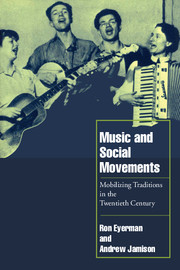Book contents
- Frontmatter
- Contents
- Acknowledgments
- Introduction
- 1 On social movements and culture
- 2 Taking traditions seriously
- 3 Making an alternative popular culture: from populism to the popular front
- 4 The movements of black music: from the New Negro to civil rights
- 5 Politics and music in the 1960s
- 6 From the sixties to the nineties: the case of Sweden
- 7 Structures of feeling and cognitive praxis
- Notes
- Bibliography
- Index
5 - Politics and music in the 1960s
Published online by Cambridge University Press: 26 October 2011
- Frontmatter
- Contents
- Acknowledgments
- Introduction
- 1 On social movements and culture
- 2 Taking traditions seriously
- 3 Making an alternative popular culture: from populism to the popular front
- 4 The movements of black music: from the New Negro to civil rights
- 5 Politics and music in the 1960s
- 6 From the sixties to the nineties: the case of Sweden
- 7 Structures of feeling and cognitive praxis
- Notes
- Bibliography
- Index
Summary
We're trying to crystallize the thoughts of young people who have stopped accepting things the way they are. Young people are disillusioned; we want to reinforce their disillusionment so they'll get more involved and do something – not out of a general sense of rebellion, but out of a real concern for what's happening – or not happening.
Phil Ochs, interviewed in Vogue, September 1, 1964 (quoted in Gottesam 1977: 70)In this chapter, we will explore the interrelations between politics and popular music in the 1960s in the United States. We will refer to popular songwriters and musicians, as well as to some of the songs that have continued to stand for the spirit of the sixties in the popular consciousness. But even more than the songs, we want to emphasize the importance of the contexts in which these songs were written and performed. In the 1960s, songs contributed to the making of a new political consciousness, and were often performed at political demonstrations and collective festivals. Singers and songs were central to the cognitive praxis of the 1960s social movements, but it is important to realize that the relations between movements and music shifted dramatically in the course of the 1960s. It was primarily in the period of transition from the civil rights movement to a broader political opposition to the war in Vietnam, that is, in the years from 1961 to 1965, that popular music could serve as the site, perhaps the most important site, of a remarkable process of experimentation and innovation, which would lead to major transformations in American and “global” culture, as well.
- Type
- Chapter
- Information
- Music and Social MovementsMobilizing Traditions in the Twentieth Century, pp. 106 - 139Publisher: Cambridge University PressPrint publication year: 1998
- 1
- Cited by

